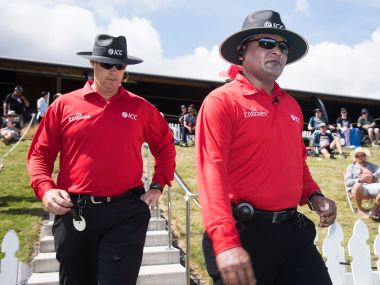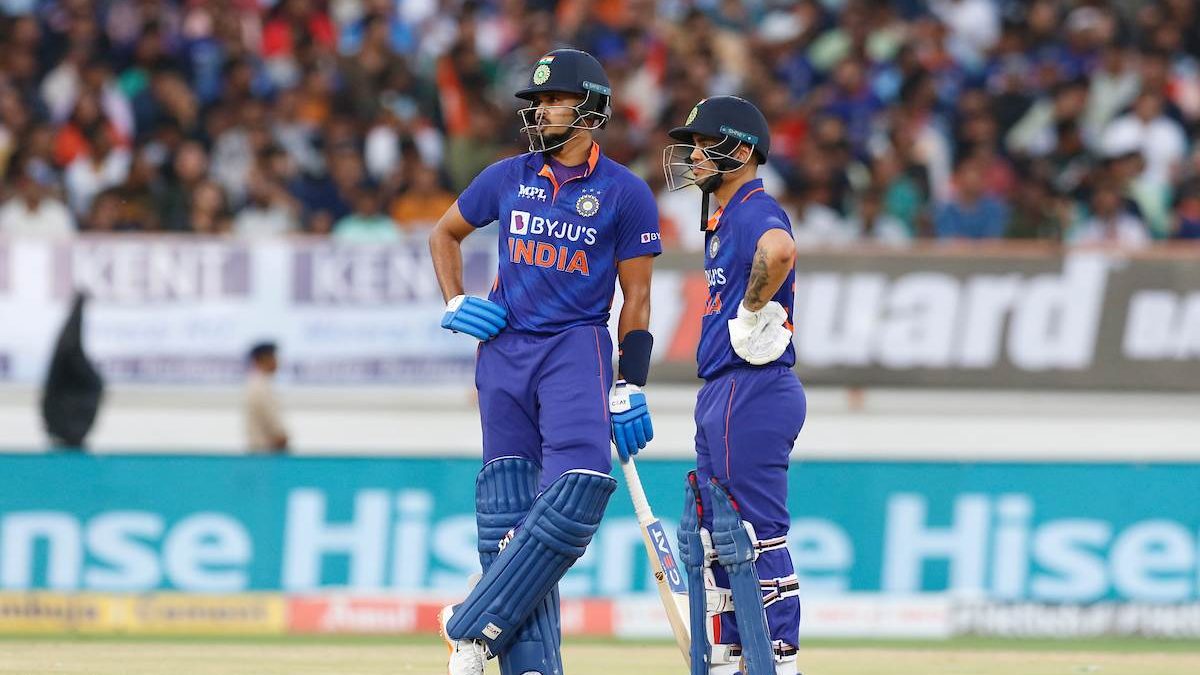It was reported before the toss for the third T20I match between India and England in Bangalore that umpire Chettithody Shamshuddin, who officiated in the second T20I at Nagpur three days earlier, was withdrawn from on-field officiating and would instead be the TV umpire. There was no press release from the BCCI or the ICC to inform the journalists of the last-minute change. In fact, according to some journalists in the press box at the Chinnaswamy Stadium, the ICC Match Referee Andy Pycroft informed them verbally about 45 minutes before the toss. The withdrawal was reported as voluntary and the reason for it was that Shamshuddin was unwell.
That would seem like an open-and-shut case. Except it appears not.
Umpire Shamshuddin was at the receiving end of England skipper Eoin Morgan’s ire since he made a couple of errors during that Nagpur T20I. There was a missed LBW of Virat Kohli and then there was the incorrect LBW decision of Joe Root in the final over of the game, which according to Morgan was a “hammer blow”.
There is no real cricketing merit to Morgan’s frustration and it wasn’t like Root was setting the field on fire — he had laboured to 38 runs off 38 deliveries, while Ben Stokes smashed 38 off 27 and Jos Buttler, 15 off 10. And of course, there was no guarantee that Root would have helped England get over the line even if Shamshuddin had spotted the inside edge that was apparent to everyone only after slow motion replays and UltraEdge information was available.
There appears to have been concerted pressures exerted from several quarters that culminated in Shamshuddin voluntarily withdrawing himself from on-field officiating and restricting himself to the TV umpire role. If Shamshuddin was so unwell not to be able to take the field, why would it be okay to burden him to pay attention to monitors for the entire duration of the match?
A bit of background. Shamshuddin officiated as one of the on-field umpires on 26 January at the Adelaide Oval during the fifth ODI between Pakistan and Australia. Apparently, he returned to India less than 24 hours before the second T20I.
Since it is the prerogative of the home board, the ICC’s guidelines of not having an umpire officiate within three days of international travel do not apply here, and BCCI chose Shamshuddin over Nitin Menon (both, along with C Nandan are in ICC’s Umpire Panel ), who had stood in the first T20I in Kanpur. The reason for it has not been made public but it is understandable that BCCI would like their second most experienced umpire, after S Ravi who serves in the ICC Elite Panel of umpires, to officiate.
Morgan expressed his displeasure with Shamshuddin’s decisions in the post-match presentation, as well as in the presser , and while speaking to Sky Sports he cited Shamshuddin’s “inexperience” as a possible reason for the errors, even as Shamshuddin has stood in 21 ODIs and 11 T20Is before that match. Morgan also indicated that he would include in his report to the Match Referee — a routine exercise for captains — about the umpiring errors by Shamshuddin.
In their studio back in England, Sky Sports’ panel of experts discussed the errors, and spent a segment on the need for Decision Review System (DRS) in T20s, like it is used in Tests and ODIs. BBC Sport asked Moeen Ali in the lead up to the third T20I about the need for DRS, and also of “neutral umpires”.
A simple Google search would indicate the various English news sites that blew the issue out of proportion and put the blame for England’s defeat on the umpire rather than the muddled batting of Root and Morgan. A Twitter search would show the abuse and mockery Shamshuddin copped from a wide cross section of fans.
It is further interesting to note that, on the day before the match in Bangalore, Nick Knight of Sky Sports in his report from the ground as the Indian team was going through their net sessions in the background said that there was “some uncertainty” over whether Shamshuddin would officiate in the third T20I. Mumbai based Mid-Day reported that “rumours were floating” on the day before the Bangalore match Shamshuddin “would be replaced”. Unless they had the ability to predict more than 24 hours in advance that Shamshuddin would be unwell and voluntarily withdraw himself, it appears to be a case of Shamshuddin becoming the fall guy to save someone else’s face.
However, a report in the DailyMail UK by Paul Newman seemed to anticipate that Shamshuddin would be stood down as well but it would be because of England’s formal complaint to the Match Referee. Another report from PA Sport seemed to support Newman’s view as well: “[I>nformal discussions with Pycroft are set to take place on the eve of the match and there remains a possibility that Shamshuddin could be moved from on-field duties to TV umpire.”
Newman tweeted once it became official that Shamshuddin would be an on-field official that it was “embarrassing for [BCCI> who defied ICC to insist he stand”.
Shamshuddin says he's 'not feeling hundred per cent' and will do TV duties. Embarrassing for Indian board who defied ICC to insist he stand
— Paul Newman (@Paul_NewmanDM) February 1, 2017
This would then mean that there was pressure quite possibly due to Morgan’s public frustration with Shamshuddin (and hence probably the England Cricket Board (ECB)) and the media for the ICC to request Shamshuddin be replaced. It is also informative to realise that even though ICC Match Referees generally are strict with public criticism of match officials by players and support staff , apparently Pycroft “had no problem with Morgan’s language and understood his frustration at three big decisions going against England”. Pycroft also seems to have had no issues with Trevor Bayliss, England’s head coach and his assistant Paul Farbrace having “had words with Shamshuddin at the end of the game”.
All of these seems to indicate that Shamshuddin has been left high and dry, and to fend for himself. It is a travesty that an unbiased adjudicator in a cricket match is being dragged through the coals for committing errors which are human and natural. For all the hue and cry about his errors, no one seems to acknowledge his excellent LBW decision to declare Stokes out off a slower delivery from Nehra earlier in the same innings.
That there immediately was the talk of DRS and neutral umpires, and that an international captain was so vociferous in expressing his displeasure and still went unpunished, and a fellow ICC official did not have his back and that he had to “voluntarily withdraw himself” must all be debilitating to Shamshuddin.
That it has come to this is an indictment of the sport, its administrators, and the supposed experts on TV, radio and print. That there is such lack of empathy for another human being who is impartial to the teams is a sign of worsening partisan instincts in cricket’s watchers.


)




)
)
)
)
)
)
)
)